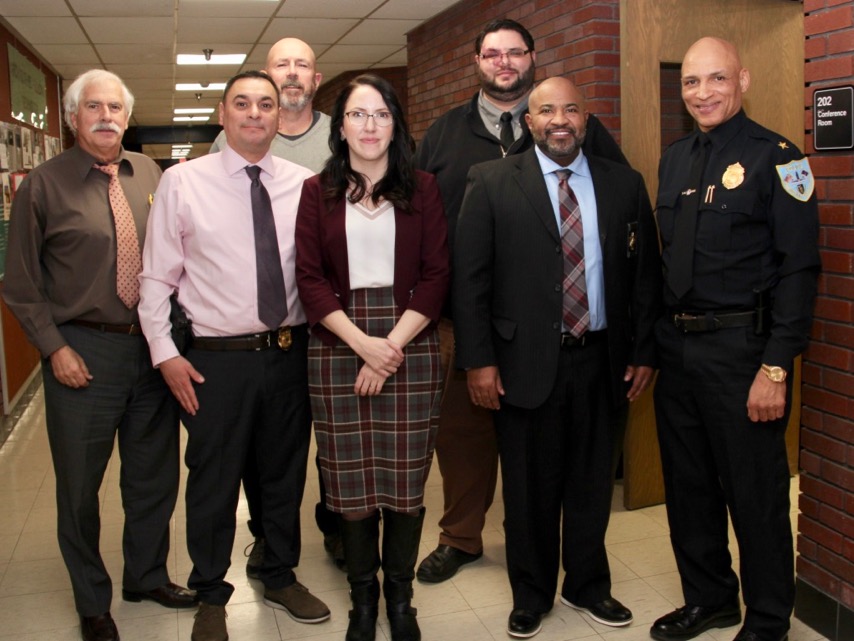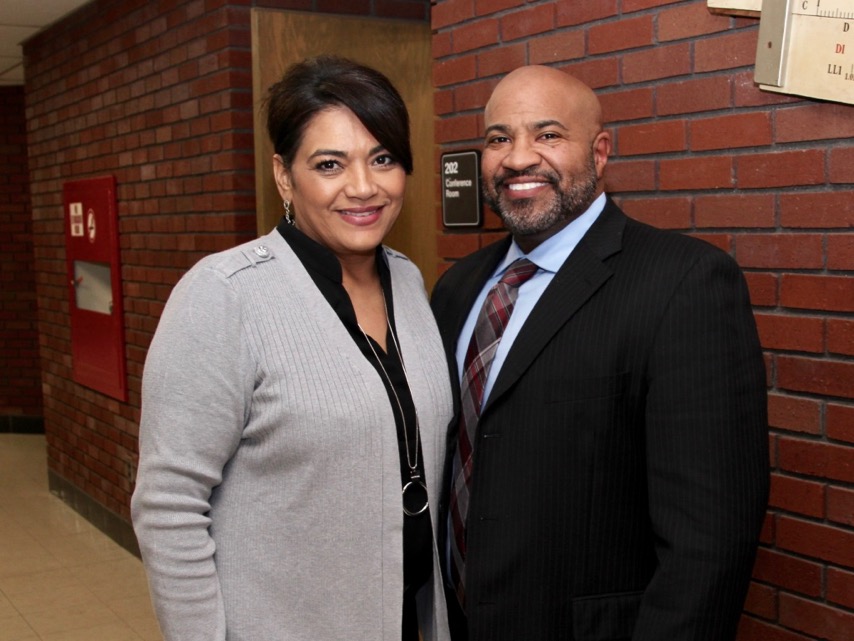STCC Criminal Justice program sparks interest in law enforcement careers
 From left, Daniel Hebert, department chair of the Criminal Justice program; Louis Rosario, a Springfield Police Department sergeant; John M. “Jack” Claffey, a professor of criminal justice at Western New England University; Sarah Fila, Hampden County assistant district attorney; Seth Dupuis, associate professor of criminal justice at STCC; John Brown, assistant superintendent, Hampden County Sheriff’s Department; and Rupert Daniel, deputy chief, Springfield Police Department.
From left, Daniel Hebert, department chair of the Criminal Justice program; Louis Rosario, a Springfield Police Department sergeant; John M. “Jack” Claffey, a professor of criminal justice at Western New England University; Sarah Fila, Hampden County assistant district attorney; Seth Dupuis, associate professor of criminal justice at STCC; John Brown, assistant superintendent, Hampden County Sheriff’s Department; and Rupert Daniel, deputy chief, Springfield Police Department.
Sarah Fila: Assistant District Attorney, Hampden County
SPRINGFIELD, Mass. - Sarah Fila lost her husband to a drunk driver and vowed to fight back.
She enrolled in the Criminal Justice Program at Springfield Technical Community College, with the goal of becoming a police officer. While taking classes, she found a job in loss prevention, investigating employees who shoplifted from stores.
The job paid well, but Fila decided she did not want to spend the rest of her career doing on-the-street police work. Fortunately, the STCC Criminal Justice Program gave her other options.
After graduating from STCC, Fila remained close to Professor Daniel Hebert, now department chair of the program. He knew how bright she was and encouraged her to go back to school to become a lawyer. Today, Fila works as a Hampden County assistant district attorney, a job she’s held for the past two years.
“If it wasn’t for the Criminal Justice Program at STCC, I don’t know that I would have ever become an ADA,” she said. “It sparked that interest in me.”
The Criminal Justice Program was started at STCC in 1969 and saw its first class of 71 students graduate two years later. The first class was mostly in-service police officers taking advantage of the federal Law Enforcement Administration Program that encouraged higher education for police officers.
Since then, the program has inspired thousands of students to pursue a variety of careers in law enforcement. Many graduates of the program – there have been 2,768 – have risen through the ranks to serve and protect the community. The program opens doors to careers in the three components of the criminal justice system: police, corrections and the courts.
If it wasn’t for the Criminal Justice Program at STCC, I don’t know that I would have ever become an ADA. It sparked that interest in me.Sarah Fila, Assistant District Attorney, Hampden County
Springfield Police Department recently promoted five STCC graduates – three new sergeants and two new lieutenants.
“Our Criminal Justice Program at STCC serves as an affordable pathway to law enforcement career,” Hebert said. “Graduates of the program understand the legal, technical and practical aspects of law enforcement procedures. We prepare them for demanding yet rewarding careers where they can make a meaningful difference in their community.”
Rupert Daniel: Deputy Chief, Springfield Police Department
Rupert Daniel went through the Criminal Justice program not long after graduating from high school. He said STCC prepared him for the police academy and future promotions.
In October 2019, Daniel, a 34-year veteran of the Springfield Police Department, was promoted to the rank of deputy chief. He is the first black deputy chief and the highest-ranking minority officer in the department’s history.
“At STCC, they told us if you’re interested in getting promoted, you might want to look at this book or pay attention to this particular area. They gave us a heads up on what’s going to be on promotional civil service exams,” Daniel said. “Getting a degree from STCC gives you a jump on people who just go to the academy.”
Louis Rosario: Sergeant, Springfield Police Department
For Louis Rosario, a sergeant with the Springfield Police Department, STCC’s criminal justice program was a way to network and prepare for promotions in his career.
“It gave me a really big leg up,” Rosario said. “The classes I was taking were geared to what I would be learning at the police academy.”
Rosario said he use to check for job openings at STCC. Professor Hebert would post openings throughout the country. Rosario was offered a job in Florida, but decided to stay in Springfield.
John Brown: Assistant Superintendent, Hampden County Sheriff’s Department
The STCC program helped John Brown rise to the level of assistant superintendent at the Hampden County Sheriff’s Department.

STCC Criminal Justice program graduates Rosa Maldonado Brown, First Assistant Chief of Probation for Hampden Superior Court, and John Brown met at STCC and have been married for more than 30 years.
It’s also where he met his wife, Rosa Maldonado Brown, the First Assistant Chief of Probation for Hampden Superior Court.
“STCC was affordable. I graduated from (the High School of) Commerce. I didn’t have money, so this was the only option,” John Brown said. “The best part is I met my wife here at STCC, and we’ve been married for over 30 years.”
Rosa Maldonado Brown: First Assistant Chief of Probation, Hampden Superior Court
Rosa Maldonado Brown started her career as a victim witness advocate in the district attorney’s office. She then took a job as a probation officer in juvenile court and now works as First Assistant Chief of Probation in Hampden Superior Court.
“What brought me to STCC quite honestly was intrinsic motivation,” she said. “I also am a first generation college student. I didn’t see (college) happening in my family. But I knew I wanted something more, and I wanted to be that graduate.”
Maldonado Brown said she was also motivated to get a college degree after facing prejudice in high school. “I was one of the few Hispanics that graduated from my class in high school,” she said. “My experience in high school and junior high was very difficult for me. But once I got to STCC, I have to say it was like being in a family. The support networks were here.”
Jack Claffey: Professor of Criminal Justice, Western New England University
John M. “Jack” Claffey enrolled at STCC after high school, but left before getting his degree to take a job. He was working as an officer for the Springfield Police Department when he decided to return to STCC to finish his associate degree.
“I realized at the time if I wanted any promotions or anything within the police department, I was probably going to have to get at least a bachelor’s degree,” Claffey said.
The late Bert Scannapieco, one of the two original members of the Criminal Justice Program, told Claffey he writes well and suggested he consider going to law school. As a first generation college student, he never thought law school was in the cards. But encouraged by Scannapieco, Claffey decided to pursue his master’s degree and went on to get his Juris Doctor degree.
Claffey opened a law practice and served as director of the regional police academy before taking an opportunity to teach at Western New England University.
“I came to STCC and I more or less found my direction while I was a student here,” Claffey said. “I found I enjoyed going to school, which is something I hadn’t experienced before in my life. I enjoyed my classes here at STCC and I enjoyed focusing on criminal justice. That’s what motivated me to go to law school. … I think community colleges are a great pathway. It worked for me.”
Interested in applying to the Criminal Justice program at STCC? Visit stcc.edu/explore/programs/lecj.as/ for more information or call Admissions at (413) 755-3333.
About Springfield Technical Community College
Founded in 1967 and located on 35 acres of the Springfield Armory National Historic Site, STCC is a major resource for the economic vitality of Western Massachusetts. As the only technical community college in Massachusetts, STCC offers a variety of career programs unequalled in the state. STCC’s highly regarded transfer programs in business, advanced manufacturing, healthcare, liberal arts, and STEM fields continue to provide the most affordable options for students pursuing a four-year degree. With an annual enrollment of about 7,000 day, evening, weekend, and online students, STCC is a vibrant campus rich in diversity.
For more information about STCC, visit www.stcc.edu. Follow us on Facebook, Twitter (@S_T_C_C) and Instagram (@stccpics).
MEDIA CONTACT:
Jim Danko, (413) 755-4812, jdanko@stcc.edu
